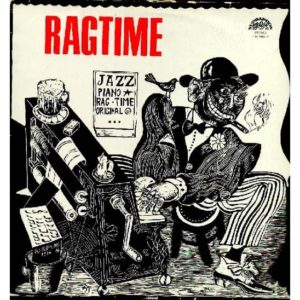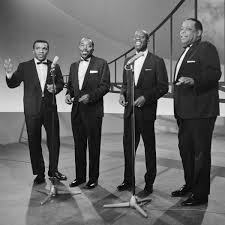
Hip Hop Poster and Explanation
By AnnaLiza Carey This is the poster I created to symbolize hip-hop as a civilization, genre, and a movement. I researched who some of the
There is a thin line between sacred and secular in the dynamic of modern soul music, both between the audience consuming music and the performers in their artistry. More often than not, artists find this dynamic through the process of defining their style and identity a part from all of the influences surrounding them. Jerma A. Jackson’s book “Singing in My Soul” unpacks Black Gospel Music in a Secular Age by documenting the paths that many African American artists have taken from the church to popular culture like: Sister Rosetta Tharpe, Sallie Martin, Mahaliza Jackson, Bessie Griffin, Shirley Caesar; and now in my argument, Jazmine Sullivan and Chrisette Michele. These artists are not at all comparable in many beyond their Black womanhood and musical start in Gospel music, but as few as their shared traits are, they are interesting to explore in the contexts of their careers and the twists and turns of their decision-making. Although some of the motivating factors of giants like Shirley Caesar to explore outside of the gospel realm are not as relevant in the careers of Jazmine Sullivan and Chrisette Michele, the motivational drive behind those movements still exist today and were still a significant influence.
Philadelphia native, Jazmine Marie Sullivan, was born in 1987 to her mother Pam Sullivan who was intimately familiar with the music industry herself as a former backup singer for Philadelphia International Record. Jazmine’s father is infamously known as a curator of the historic landmark “The Strawberry Mansion” in Philadelphia where the family resided since Jazmine was 5 years old. Her mother has described her vocal ability as a gift that “[came] from…the same place legends get their gifts from,” Pam says. “It’s not that she practices more than anybody else. It was just given to her.” (Ellis, 2015). In her youth, Jazmine was specifically prohibited to listen to sing anything, but gospel music and was raised in this fashion singing gospel in her church as a contralto both in the children’s and adult choir. Initial fame for this extremely gifted artist first came about from videos of her performing as a child at the tender age of 11 in 1998 in the sixth grade. She delivered a truly astounding performance as Dorothy in a school production of the Wiz, and a home video of her singing Home went viral. Soon after, she was able to land a spot within the same year on Apollo kids with Steve Harvey where she performed “Accept What God Allows”. This is a time in Jazmine’s life where she knew she loved to sing and took advantage of any chance possible.
Following her media fame, Jazmine went on to attend Philadelphia High School for the Creative and Performing Arts where she majored in vocal music.She was invited to sing with Stevie Wonder due to this early exposure at his grandson’s birthday party. Despite being signed to Jive Records at 15, and writing and recording an entire album, and working closely with stars like Missy Elliot; she was dropped by Jive records in 2002 and wouldn’t release her first album until 2008. Throughout this entire timeline of her current career, Sullivan was often encouraged to perform gospel songs for events all over the country, like the video below of her performing “Jesus Loves Me” for a Women’s conference in Bakersfield, CA.
Fans of the artist recall her hiatus from the music or any appearance for three years, leaving those who were tuned in clueless and concerned by the message on Twitter she left in 2011: “I’m taking a break from music. I’m trying to figure out who I am. I promised myself when it wasn’t fun anymore I wouldn’t do it. And, here I am. I’m not saying I won’t ever sing again in my life because I don’t believe that. But in this moment… right now… got some things to figure out.” An article called “Robo‐Diva R&B”: Aesthetics, Politics, and Black Female Robots in Contemporary Popular Music” by Robin James explores the creation of the non-human image created by popular Black female artists like Rihanna and Beyonce through music videos and performances and the effect that this has on Black women in the industry. Jazmine opened open to some sources in interviews about her struggles with body image when she began to gain more popularity which partially led to her hiatus.
Chrisette Michele was born December 8, 1982 in Patchogue, New York to a sociologist for a father and a psychologist as a mother. Like Jazmine, Chrisette received formal musical training and obtained her degree in vocal performance from Five Towns College. Chrisette Michele’s career began as a featured artist gaining momentum from artists like The Game, Jay-Z, Nas, Kanye West, and Ghostface Killah’s. In high school, Michele served as a leader of their gospel choir and her early life was heavily influenced by the gospel sound and sacred foundation that her family valued. Her first album was released in 2007 titled “I Am” which interesting features songs with titles closely related to gospel music like “If I Have My Way” and “Best of Me” (The Best in Me) which even if not directly intentional, is an interesting choice. In an interview with the Breakfast Club Power 105.1 FM, Chrisette Michele shares that “When I sing my own music and then I sing a gospel song at my concerts, those are usually the songs that get the most response”. This “flip-flopping” between the sacred and secular is evident in so many different aspects of Michele’s career, and especially in 2010 when she released a studio version of “Total Praise” around the same time that she also released her third album Let Freedom Reign. Jazmine Sullivan and Chrisette Michele even sang together to raise money for natural disaster efforts, singing a gospel song, along with Kirk Franklin and India Arie in 2010.
Let Freedom Reign (Chrisette’s Third Album released in 2010)
| 1. | “Fairy Tales and Castles (Part 1)” | Chrisette Payne, Charles Harmon | 0:34 |
| 2. | “I’m a Star” | Shaffer Smith, Harmon | 4:13 |
| 3. | “Number One” | Payne, Linette Payne, Harmon | 3:37 |
| 4. | “Fairy Tales and Castles (Part 2)” | Payne, Harmon | 0:28 |
| 5. | “I Don’t Know Why, But I Do” | John Stephens, Jazmine Sullivan | 3:59 |
| 6. | “Let Freedom Reign” (feat. Talib Kweli & Black Thought) | Payne, Harmon, Talib Greene, Tariq Trotter | 4:21 |
| 7. | “Goodbye Game” | Payne, Harmon | 3:57 |
| 8. | “So Cool” | Smith, Harmon | 4:00 |
| 9. | “So in Love” (feat. Rick Ross) | Payne, Harmon, William Roberts | 4:12 |
| 10. | “So in Love (Skit)” | 0:11 | |
| 11. | “I’m Your Life” | Payne, Harmon | 3:14 |
| 12. | “I’m from NY (Skit)” | 0:17 | |
| 13. | “Unsaid” | Payne, Harmon | 4:23 |
| 14. | “If Nobody Sang Along” | Payne, Harmon | 3:45 |
| 15. | “I Know Nothing” | Payne, Harmon | 3:40 |
In an interview with the Breakfast Club Chrisette Michele shared in response to whether she regretted performing for the inauguration that she “regrets everything that happened”; not just the performance, but the ripple effect it had in her career and her personal life. Months after the inaugural performance, Chrisette Michele opened up to the media about her miscarriage which she attributes to the immense stress she has been under with her own health complications mixed with the stress of backlash and ridicule.She went on to share that she felt like if she could just share a message of hope with the world, they would feel more at ease with the election of number 45. This very closely mirrors one of the ideas in Singing in My Soul (Jackson, 2004) where he talks about the role of women as “musical missionaries” in the Black church. This particular chapter highlights the story of Sister Rosetta Tharpe and her role in the Church of God in Christ where she traveled with her mother to perform gospel on street corners throughout the country to do God’s work. This is a moment in history that informed the trajectory of Black women’s roles who use their vocal talents to praise the lord.
Another theme explored in Singing in My Soul is the idea of “Exuberance or Restraint” in the time of Reconstruction specifically during African American history when establishing churches and organizations. Interestingly, the chapter talks about the rejection (restraint) from emotional religious music and the encouragement of using hymnals over oral “slave songs”. However the indication of a period of reconstruction is not only physical, but can also be personal.Chrisette Michele to this day will argue that her performance for number 45 was on the behalf of Black Americans not in spite of. For Jazmine Sullivan, Chrisette Michele, Burnell Taylor, India Arie, and Mali Music fluidly navigate secular and sacred music to the dismay of many. For Chrisette Michele, however, her waver in not only style of music, but also in her discernment between brand-benefitting performances; her career has taken a turn. Whether choosing exuberancy or restraint, religious mission or secular stardom, there is a particularly unforgivable line crossed when money is made at the cost of your own people. Only time will tell how and if she may recover musically from this. Jazmine Sullivan, on the other hand, has yet to produce another album since she has returned from her hiatus, but her loyal fans still support her in any possible way that she can whether it be gospel or secular. It will be interesting to see if more artists being to assume the ambiguous identity of performing both secular and sacred music.
Jazmine Sullivan
Cunningham, P. L. (2010). “Theres Nothing Really New under the Sun”: The Fallacy of the Neo-Soul Genre. Journal of Popular Music Studies, 22(3), 240-258.
doi:10.1111/j.1533-1598.2010.01240.x
Ellis, S. (2015, March 27). The Psychology of Jazmine Sullivan. Retrieved February 18, 2018, from
https://www.vibe.com/2015/01/feature-the-psychology-of-jazmine-sullivan/
Hughes, T. S. (2003). Groove and Flow: Six Analytical Essays on the Music of Stevie
Wonder. University of Washington. Retrieved February 18, 2018, from
http://www.steviewonder.org.uk/bio/life-stories/groove&flow/T.Hughes%20-%20Groove%20And%20Flow%20(S.Wonder).pdf
Jackson, J. A. (2004). Singing in my soul: black gospel music in a secular age. Chapel
Hill: University of North Carolina Press.
James, R. (2008). “Robo-Diva R&B”: Aesthetics, Politics, and Black Female Robots in Contemporary Popular Music. Journal of Popular Music Studies, 20(4), 402-423.
doi:10.1111/j.1533-1598.2008.00171.x
Jazmine Sullivan Gets Personal On ‘Love Me Back’ [Interview by L. Hansen]. (2010,
November 27). NPR.
Kelly, C. (1970, January 01). Jazmine Sullivan: One of R&B’s richest voices soars at
Fillmore after hiatus. Retrieved February 18, 2018, from
https://www.washingtonpost.com/entertainment/music/jazmine-sullivan-one-of-randbs-richest-voices-soars-at-fillmore-after-hiatus/2015/03/10/97f42adc-c72d-11e4-b2a1-bed1aaea2816_story.html
Sangwei, Y. (2015, May 5). Jazmine Sullivan Covers Randy Newman’s “Baltimore” for Nina Simone Tribute Album. Essence.

By AnnaLiza Carey This is the poster I created to symbolize hip-hop as a civilization, genre, and a movement. I researched who some of the

I created this poster in an attempt to caput the music of African American artists between the years 1960 to 1980s. I chose to
The following are the notes that I took while enjoying Earth, Wind, and Fire’s performance at the Greek Theatre in Chicago: The first song has

by AnnaLiza Carey The classical music genre evolved from the baroque genre in Europe, from the mid-1700s to 1820. Classical music, in its origin, is

By AnnaLiza Carey The origins of ragtime extend far beyond the ice cream truck theme song which has continued to popularize its sound for generations

AnnaLiza Carey In the beginning of this course, I did not know the extent of how frequently the African diaspora had been disenfranchised of music,

African American sacred tradition is a strong pillar in the evolution of African influence on music in the US and at the root of several

by AnnaLiza Carey and Katie Eugene In our study of folk music, my partner and I focused on two artists: Elizabeth Cotton and Leadbelly, to
By AnnaLiza Carey and Karlie Eugene My partner and I researched Negro Spirituals and the important milestones in Black history that shaped musical expression. Spirituals
Hello, my name is AnnaLiza Reeves Carey. I was born in Boston, Massachusetts, but spent most of my time growing up in New Jersey. I

Login to your account